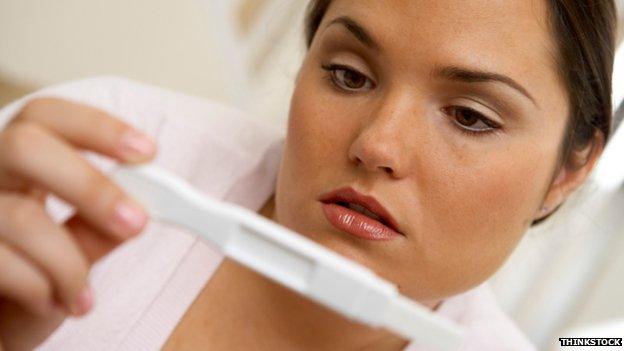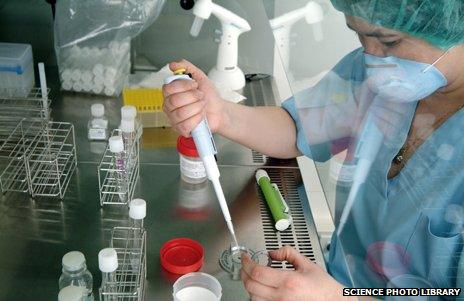A Point of View: IVF and the marketing of hope
- Published

Five million babies have been born thanks to IVF. But few people talk of the many more times the treatment doesn't work, says Lisa Jardine, the departing chair of the Human Fertilisation and Embryology Authority.
Modern medicine can achieve extraordinary feats in repairing and protecting the human body, from hip replacements to life-extending cancer treatments. But for most of us, I think, there are two areas of medical intervention that have a very special status and deserve the closest ethical attention: birth and death, the creation of life and its termination.
Just such close scrutiny was given to an amazing breakthrough in the treatment of infertility - the birth of the first "test tube baby", Louise Brown, in Oldham in 1978.
As further successful IVF births followed, it was quickly decided by the British government that some sort of ethical and legal oversight was needed.
Treating infertility by combining egg and sperm outside the womb, and then replacing the resulting embryo in the mother, was an established clinical reality. The question was, is it ethically acceptable to carry out the procedure, and what limitations and controls should be placed upon it to satisfy public concern?
In summer 1984, the report of the Committee of Inquiry into Human Fertilisation and Embryology - the Warnock Report - was published.
The task of the committee had been "to examine the social, ethical and legal implications of recent, and potential developments in the field of human assisted reproduction".
The report highlighted the "special status" of the human embryo, and proposed the establishment of a regulator. The legislation derived from the report continues to govern In Vitro Fertilisation (IVF) in the UK 30 years later under that regulator, the Human Fertilisation and Embryology Authority, or HFEA.
Dame Mary Warnock - now Baroness Warnock - turned out to be the ideal person to steer the public moral debate on IVF. As commentator Andrew Brown wrote in 2003, external: "Her distrust of grand schemes and theories [made] her much in demand as a kind of philosophical plumber to the establishment - whenever some tricky problem arose, she could be trusted to get things flowing again."
Born into an old-fashioned, well-to-do family, Warnock studied Classics at Oxford, and became a lecturer in philosophy at St Hugh's College in 1949. Turning her attention to schooling after the birth of her five children, she became head of Oxford High School in 1966, and spent six years championing girls' secondary education.
In the 1970s, she moved into public life and began to demonstrate her considerable skills as a committee chair capable of dealing with tricky political and ethical issues. She chaired a Home Office Commission of Inquiry into the use of animals in laboratory experiments, and a government commission on the education of children with special needs.
Her clear-headedness and keen intellect helped dissect the issue and structure the agenda in whatever controversial arena she engaged in. These talents were complemented by her administrative skill, and her shrewd grasp of politics. She knew which recommendations would work administratively while being politically workable too.
Even she probably did not anticipate the furore the Warnock Report would cause. There was opposition from religious figures, politicians and the general public to the very practice of this way of creating new life. It is a real tribute to the care with which the report was written that eventually legislation to regulate IVF went on to the statute book, and the regulatory body to oversee it - the HFEA - was set up. "Perhaps the greatest achievement of the Warnock committee is that it managed to get an ethical consensus that people understood as well as shared," observed a former HFEA chair.
The results of Warnock's astuteness are to be seen in the formal structure of the HFEA as established in 1990. It must have expert medical and scientific representation, she advised, but it ought to be led by a lay chair - someone with strong ethical beliefs, but outside the IVF sector. Each of its decision-making committees should also have a lay majority.

Louise Brown, centre back, the first of five million "test tube babies"
I have served as chair of the HFEA for the past six years. Next month will be my last authority meeting. So it seems an appropriate moment to reflect on my experience in that role.
I have seen at first hand how the regulation of IVF uses the most elegant features of UK regulatory legislation to best advantage.
Legislation is passed which lays down a broad-brush picture of a sensitive area's activities and how they need to be monitored. Then the specialist regulator monitors those activities on a day-to-day basis - in the case of IVF, recording the details of every one of the 60,000 cycles carried out in a calendar year, inspecting and licensing clinics in both the NHS and the private sector and approving research involving embryos.
In a fast-changing field, decisions on difficult or anomalous cases are taken on an individual basis, with the best available expert advice, and policy is developed to cover new techniques and circumstances as they emerge.
The most important consequence of the close scrutiny the HFEA gives is that public confidence is robustly maintained, even as the possibilities given to those unable to have children naturally, but desperate to do so, expand at a giddying speed.
Baroness Warnock will have been barely aware in the 1980s of clinical possibilities which now enable parents who carry a rare genetic defect to have their embryos screened, and an undamaged one selected, so that the baby will not die in infancy. She could not have imagined the technique of mitochondrial replacement - removing the nucleus from an egg with mitochondrial abnormalities, and placing it in a donor egg.

Over the past two years, the HFEA has carried out a consultation process with clinicians, scientists and the public in order to advise the present government on whether this technique - which has up to now only been allowed in the research laboratory - should be introduced into clinical practice.
Perhaps surprisingly, the public supported the new technique, if it could prevent serious illness. They had little objection to its being approved for clinical use, as long as it was scrupulously overseen by an appropriate regulatory body.
Like any outgoing chair, there are, of course things I regret not having achieved.
My personal mission when I took up the post was, inevitably given my interests, public engagement - disseminating as widely as possible both the benefits and disadvantages of all aspects of assisted reproduction.
This proved to be unexpectedly difficult to do. There is an extraordinarily high level of coverage of any story involving IVF in the media - celebrity births, tales of miracle babies after years of trying, and above all, breakthroughs in clinical practice which may bring hope to thousands wishing for their own child.
This is a sector that trades in hope, and the papers and women's magazines are full of encouragement.

Some British parents have opted instead for surrogates
Yet the success rates for IVF remain discouragingly low. The last figures we have show that for every cycle of IVF, fewer than a third of patients will emerge with a baby (the figures are somewhat higher for women under 35). That leaves two thirds of would-be mothers and fathers with the heartbreak of "failure".
And the costs are high - 60% of IVF treatment in Britain is carried out in private clinics, but the HFEA has no control over the prices charged. A couple - and nowadays that means same-sex couples as well as traditional partnerships - is likely to have spent something of the order of £15,000 for the three cycles it is likely to have taken should they be fortunate enough to become pregnant.
I would have loved to have been able to have spoken more often and more publicly, with more words of caution for those proposing to undertake IVF, or postponing their family because IVF seems a reliable option should natural conception fail. Columnist Zoe Williams wrote a telling piece about the heartache of unsuccessful treatment last month, headlined Where's all the grief going?, external
But newspapers today want banner headlines and excitement. Public information is nowhere on their agenda.
Try as I might, I have not been able to talk at length to all those families out there who are about to enter the world of IVF, or who are undergoing treatment and being persuaded to try again and again when it fails, or who are entering their 40s and hoping IVF will allow them to start a late family.
The world of IVF is a market, a market in hope. Those who enter it deserve to be fully informed of its potential to deliver grief and a sense of failure, as well as success.
Follow @BBCNewsMagazine, external on Twitter and on Facebook, external